where when that 定语从句
- 格式:doc
- 大小:14.50 KB
- 文档页数:6
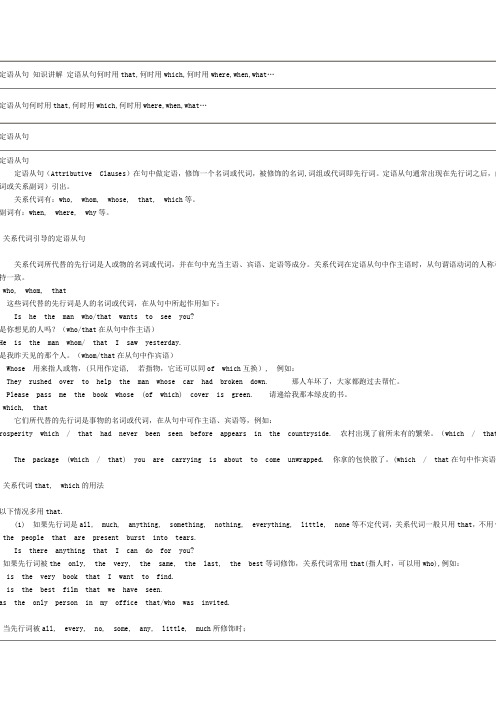
定语从句知识讲解定语从句何时用that,何时用which,何时用where,when,what…定语从句何时用that,何时用which,何时用where,when,what…定语从句定语从句定语从句(Attributive Clauses)在句中做定语,修饰一个名词或代词,被修饰的名词,词组或代词即先行词。
定语从句通常出现在先行词之后,由词或关系副词)引出。
关系代词有:who, whom, whose, that, which等。
副词有:when, where, why等。
关系代词引导的定语从句关系代词所代替的先行词是人或物的名词或代词,并在句中充当主语、宾语、定语等成分。
关系代词在定语从句中作主语时,从句谓语动词的人称和持一致。
)who, whom, that这些词代替的先行词是人的名词或代词,在从句中所起作用如下:Is he the man who/that wants to see you?是你想见的人吗?(who/that在从句中作主语)He is the man whom/ that I saw yesterday.是我昨天见的那个人。
(whom/that在从句中作宾语)Whose 用来指人或物,(只用作定语, 若指物,它还可以同of which互换), 例如:They rushed over to help the man whose car had broken down. 那人车坏了,大家都跑过去帮忙。
Please pass me the book whose (of which) cover is green. 请递给我那本绿皮的书。
)which, that它们所代替的先行词是事物的名词或代词,在从句中可作主语、宾语等,例如:rosperity which / that had never been seen before appears in the countryside. 农村出现了前所未有的繁荣。

定语从句的应用及that和where用法定语从句在英语中扮演着非常重要的角色,它通过对主句进行修饰、补充或限定,让整个句子更具丰富性和表达力。
在定语从句的构成中,常用的引导词包括关系代词that、which,以及关系副词where、when等。
本文将重点探讨定语从句中特别常见的that 和where的应用。
使用that引导的定语从句1. 作为主语或宾语 - The book that I bought yesterday is very interesting. - She is the person that I admire most.2. 作为先行词为物的定语从句 - The house that Jack built is now for sale. - Here is the pen that you were looking for.3. 用于指代人或物 - The film that we watched last night was amazing. - The friend that helped me when I was in trouble is very kind.4. 用于非限制性定语从句 - My dog, that is a Labrador, loves to play in the park. - The hotel, that we stayed at last summer, had a beautiful view.使用where引导的定语从句1. 表示地点 - I still remember the place where we first met. - This is the town where I grew up.2. 表示特定场所 - The library where I study is very quiet. - Do you remember the restaurant where we had dinner last week?3. 表示方位,有时还可用于时间状语从句 - The room where my parents sleep faces the garden. - I will never forget the day where we won the championship.4. 在介词后,表示地点 - This is the house where she lived in for many years. - Can you show me the park where you usually go jogging?定语从句的使用能丰富句子结构,使语言表达更加清晰明了。
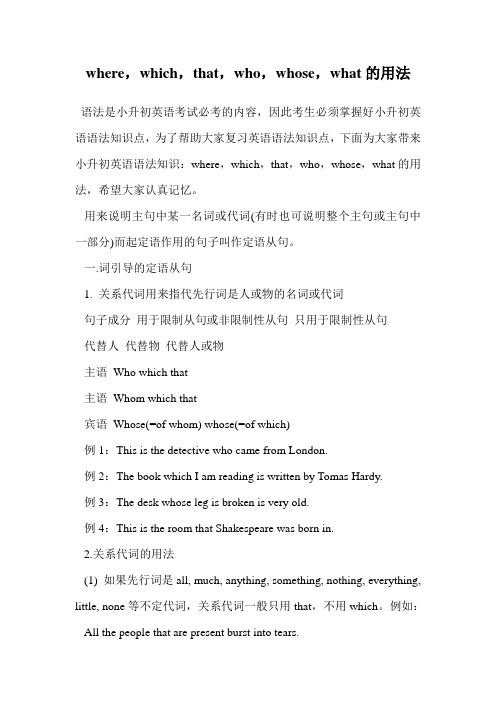
where,which,that,who,whose,what的用法语法是小升初英语考试必考的内容,因此考生必须掌握好小升初英语语法知识点,为了帮助大家复习英语语法知识点,下面为大家带来小升初英语语法知识:where,which,that,who,whose,what的用法,希望大家认真记忆。
用来说明主句中某一名词或代词(有时也可说明整个主句或主句中一部分)而起定语作用的句子叫作定语从句。
一.词引导的定语从句1. 关系代词用来指代先行词是人或物的名词或代词句子成分用于限制从句或非限制性从句只用于限制性从句代替人代替物代替人或物主语Who which that主语Whom which that宾语Whose(=of whom) whose(=of which)例1:This is the detective who came from London.例2:The book which I am reading is written by Tomas Hardy.例3:The desk whose leg is broken is very old.例4:This is the room that Shakespeare was born in.2.关系代词的用法(1) 如果先行词是all, much, anything, something, nothing, everything, little, none等不定代词,关系代词一般只用that,不用which。
例如:All the people that are present burst into tears.(2) 如果先等词被形容词最高级以及first, last, any, only, few, mush, no, some, very等词修饰,关系代词常用that,不用which, who,或whom。
例如:(3) 非限制性定语从句中,不能用关系代词that,作宾语用的关系代词也不能省略。
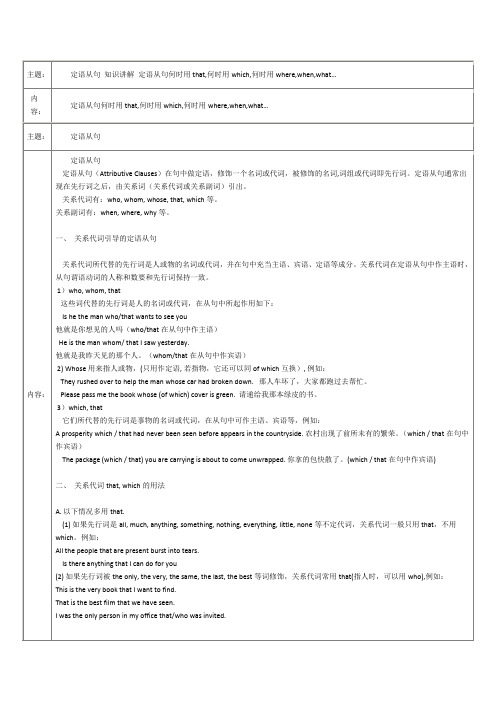
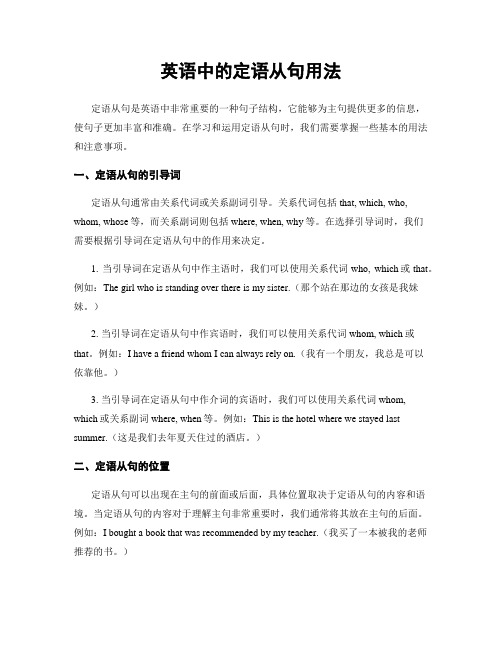
英语中的定语从句用法定语从句是英语中非常重要的一种句子结构,它能够为主句提供更多的信息,使句子更加丰富和准确。
在学习和运用定语从句时,我们需要掌握一些基本的用法和注意事项。
一、定语从句的引导词定语从句通常由关系代词或关系副词引导。
关系代词包括that, which, who, whom, whose等,而关系副词则包括where, when, why等。
在选择引导词时,我们需要根据引导词在定语从句中的作用来决定。
1. 当引导词在定语从句中作主语时,我们可以使用关系代词who, which或that。
例如:The girl who is standing over there is my sister.(那个站在那边的女孩是我妹妹。
)2. 当引导词在定语从句中作宾语时,我们可以使用关系代词whom, which或that。
例如:I have a friend whom I can always rely on.(我有一个朋友,我总是可以依靠他。
)3. 当引导词在定语从句中作介词的宾语时,我们可以使用关系代词whom, which或关系副词where, when等。
例如:This is the hotel where we stayed last summer.(这是我们去年夏天住过的酒店。
)二、定语从句的位置定语从句可以出现在主句的前面或后面,具体位置取决于定语从句的内容和语境。
当定语从句的内容对于理解主句非常重要时,我们通常将其放在主句的后面。
例如:I bought a book that was recommended by my teacher.(我买了一本被我的老师推荐的书。
)另外,当定语从句的内容对于理解主句并不是非常重要时,我们通常将其放在主句的前面,并用逗号与主句隔开。
例如:The weather being fine, we decided to go for a picnic.(天气很好,我们决定去野餐。

when/where/why引导的定语从句的用法when, where, why属于关系副词,都在其引导的定语从句中充当状语,其具体用法如下:1. 关系副词 when引导定语从句(包括限定性定语从句和非限定性定语从句)修饰表示时间的先行词,在定语从句中充当时间状语。
例如: I still remember the day when I first met Jennifer.我仍然记得第一次见到詹妮弗的那一天。
// Next month, when you’ll spend your summer holidays in your hometown, is approaching. 下个月即将来临,届时你们将在家乡度暑假。
2. 关系副词where引导定语从句(包括限定性定语从句和非限定性定语从句)修饰表示地点的先行词,在定语从句中充当地点状语。
例如: This is the office where he worked. 这就是他工作过的办公室。
// She is going to live in Macao, where she has some close friends. 她要到澳门去定居,在那里她有几个密友。
3. 关系副词why引导限定性定语从句修饰先行词reason,在定语从句中充当原因状语。
例如: I don’t know the reason why he came so late. 我不知道他来得那么晚的原因。
// That is the reason why I don’t want to go. 那就是我不想去的理由。
// He didn’t tell me the reason why he was so upset.他没有告诉我他为什么那样心烦意乱。
注意:关系代词与关系副词之间并非毫无关联,两者之间存在密切的联系。
在备考中尤其要注意以下几点:1. 很多情况下关系副词用“介词+which/whom”来代替,其中的介词由先行词或定语从句中谓语动词的形式来决定,例如:The day when I met the famous pop star was the greatest day of my life.= The day on which I met the famous pop star was the greatest day of my life.见到这位著名歌星的那天是我一生中最重要的日子。
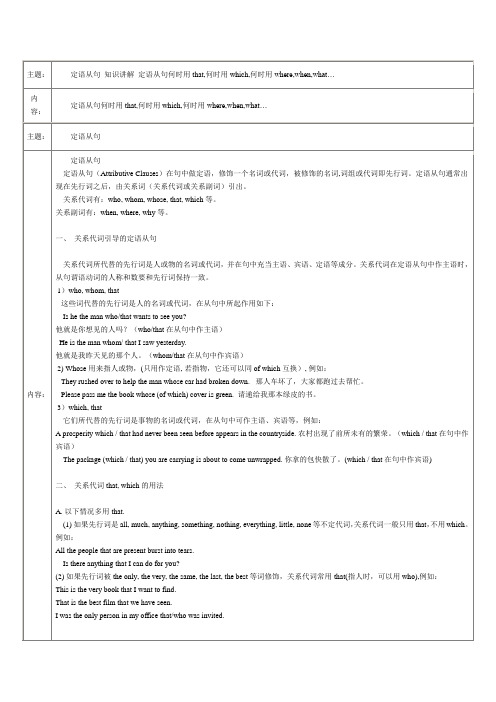
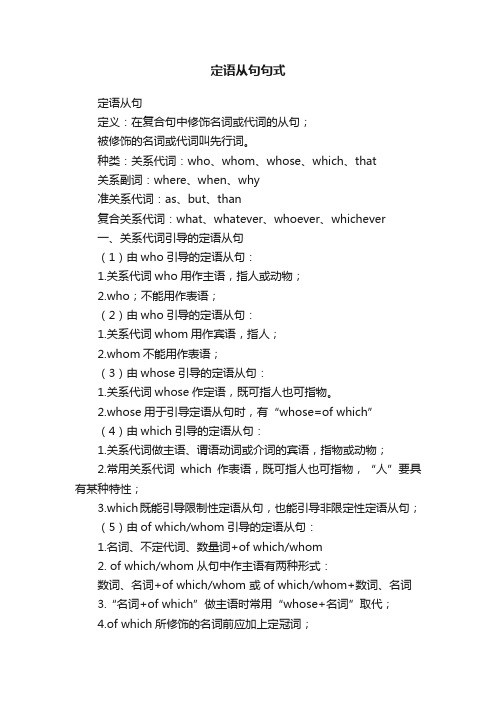
定语从句句式定语从句定义:在复合句中修饰名词或代词的从句;被修饰的名词或代词叫先行词。
种类:关系代词:who、whom、whose、which、that关系副词:where、when、why准关系代词:as、but、than复合关系代词:what、whatever、whoever、whichever一、关系代词引导的定语从句(1)由who引导的定语从句:1.关系代词who用作主语,指人或动物;2.who;不能用作表语;(2)由who引导的定语从句:1.关系代词whom用作宾语,指人;2.whom不能用作表语;(3)由whose引导的定语从句:1.关系代词whose作定语,既可指人也可指物。
2.whose用于引导定语从句时,有“whose=of which”(4)由which引导的定语从句:1.关系代词做主语、谓语动词或介词的宾语,指物或动物;2.常用关系代词which作表语,既可指人也可指物,“人”要具有某种特性;3.which既能引导限制性定语从句,也能引导非限定性定语从句;(5)由of which/whom引导的定语从句:1.名词、不定代词、数量词+of which/whom2. of which/whom从句中作主语有两种形式:数词、名词+of which/whom 或of which/whom+数词、名词3.“名词+of which”做主语时常用“whose+名词”取代;4.of which所修饰的名词前应加上定冠词;(6)由介词+which+抽象名词引导的定语从句:1.在非限制性定语从句中,以“介词+which+抽象名词”结构补充说明,which作定语;2.the way后接定语有三种形式:不加;加that;加in which;(7)由that引导的定语从句:1.关系代词that在从句中作主语或宾语,不作介词宾语,既指人也指物;2.先行词是不定代词时,必须用that引导定语从句;3.先行词被不定代词修饰时,必须用that引导定语从句;4.先行词被序数词或形容词最高级修饰时,必须用that引导定语从句;5. 先行词既有人又有物时,必须用that引导定语从句;6. 先行词被the only、the same、the last修饰时,必须用that 引导定语从句;7.以who、which引起的问句中,为避免重复,常用that引导定语从句;8.用作关系副词以修饰表示时间的名词时,常用that代替when 引导定语从句;9.构成非限制性定语从句时,不用that;10关系代词前有介词且指物时,不用that;11.先行词本身是that时,不用that;12.关系代词之后有插入成分时,不用that;二、关系副词引导的定语从句(1)由when的定语从句:1.关系副词when是兼有连词作用的副词,常用于表示时间;2.先行词为表示时间的名词;3在口语中,先行词为表示时间的名词时,可以省略when;4先行词在从句中起副词作用作时间状语时,用when引导定语从句;先行词在从句中起代词作用作宾语时,用which/that引导定语从5.在this/that/it’s后可省略先行词the time;6.现代英语口语中,the day when、the time when、the moment when可用that代替;;7.关系副词when可用恰当的“介词+which”代替;(2)由where引导的定语从句:1. 关系副词where是兼有连词作用的副词,常用于表示地点;2.先行词为表地点或有地点含义的抽象名词;3.在口语中,先行词是place、room等词时,可以省略where;4.先行词在从句中起副词作用作地点状语时,用where引导定语从句;先行词在从句中起代词作用作宾语时,用that/which引导定语从句;5. 在this/that/it’s后可省略先行词the place;6. 现代英语口语中,the place where可用the place that代替;7. 关系副词where可用恰当的“介词+which”代替;(3)由why引导的定语从句:1. 关系副词why兼有连词作用的副词,常用于表示原因;2.先行词只有reason;3.在口语中,可以省略why;4.先行词reason在从句中起副词作用表原因时,用why引导定语从句;先行词reason在从句中起代词作用作宾语时,用that/which引导定语从句;5.在this/that/it’s后可省略先行词the reason;6.现代英语口语中,the reason why可用the reason that代替;7. 关系副词why可用恰当的“介词+which”代替;(4)由介词+where/when引导的定语从句:1.from where引导的定语从句中,where代表主句提供的地点;2.since/by when引导的定语从句中,when代表主句提供的时间三、准关系代词引导的定语从句(1)由准关系代词as引导的限制性定语从句:1.as既可作引导状语从句的连词,也可作引导定语从句的关系代词;2.在such…as引导的定语从句中,as在从句中作主语或表语;3.在the same…as引导的定语从句中,as在从句中作主语或宾语;4.在as…as引导的定语从句中,as在从句中作主语;5.区别:such…as引导定语从句,such…that引导结果状语从句;6.区别:the same…as指两物相似,the same…that描述的是同一物;(2)由准关系代词as引导的非限制性定语从句:1.as代表主句或主句一部分的意思,不能指代某个名词或代词;2.在as引导的非限制性定语从句中,as可以放在主句的任意位置,在从句中作主语或宾语;3.主句表否定,as引导的定语从句位于主句之后时,as指代的主句不表否定,可用but代替;4.主句表否定,as引导的定语从句位于主句之前时,as指代的主句仍表否定意义;5非限制性定语从句中,which引导的从句不能放在主句前,as 引导的从句可放在主句前后.;6.非限制性定语从句中,as/which用作关系代词时都可指代一个句子,但as有“就像”之意;7.非限制性定语从句中,当从句的谓语动词时be动词或连系动词时,as/which都可作主语;8.非限制性定语从句中,当从句的谓语动词是行为动词时,只能用which作主语;9.非限制性定语从句中,as可作连词引导状语从句,构成“as+过去分词”形式,表定语义;(3)由准关系代词but引导的定语从句:1.but本身含有否定义,相当于who/which/that…not;2.but的先行词往往是有否定义的代词或名词词组,通过双重否定表强烈肯定;3.but用于定语从句中作主语,此时谓语动词的数要与先行词一致,时态要与主句一致;4.but用于引导状语从句时,有“but=that...not”(4)由准关系代词than引导的定语从句:1.than引导的定语从句中,谓语动词的数和时态必须与被比较级修饰的先行词一致;2.than引导的状语从句中,用作连词的than可兼作关系代词在主句中作主语,than指代主句;3.than引导的状语从句中,构成“than+过去分词”结构,than 后省略了形式主语it、动词be;四、复合关系代词引导的定语从句(1)复合关系代词what引导的定语从句:1.定语从句中,what是由先行词和关系代词组成的复合词,是兼作先行词的关系代词;2.what用于指人时,what=the person that;what用于指物时,what=the thing(s) which;3.what在定语从句中起名词作用时,可作主语、宾语、表语;4.what在定语从句中起形容词作用时,修饰名词,意为“仅有的”;5.what在定语从句中起形容词作用时,常与few、little连用,意为“尽管不多,但已全部”;6.what引导的名词性从句中,无疑问义,可作从句的主语、宾语、介宾、宾补;7.what用于表比喻义的特殊结构:A is to B what C is to D;8.what组成的常用短语:What if…? 如果…怎么样?What of it?那又怎么样?(2)复合关系代词whoever,whomever,whichever,whatever引导的定语从句:1.whoever、whomever、whichever、whatever具有名词功能,引导名词性从句;2.whoever、whomever、whichever、whatever指代未知的人或物,在从句中作主语或宾语;3.whichever、whatever在名词性从句中兼起形容词作用,修饰从句中名词,意为“仅有的”;4. whoever、whichever、whatever在名词性从句中兼起副词作用,引导让步状语从句;五、关系代词的省略1.当关系代词在定语从句中作宾语时往往省略;2.当关系代词在定语从句中作表语时,用that且往往省略;3.当先行词为不定代词时,往往不用关系代词;4.当定语从句为there be句型时,往往不用关系代词;5.当主句为there be句型时,实际主语后若带有定语从句,作主语的关系代词有时省略;六、插入语(1)分句用作插入语:I believe、I find、I hear、I imagine、I remember、I think、I sup pose…(2)状语分句作插入语:1.可作插入语的状语分句有:as far as I know、as I told you before、if you like…2.省略形式的状语分句作插入语:if ever、if possible、if any…(3)what构成的惯用插入语:1.“what+be+比较级形容词”结构,意为“而且,尤有甚者“;2.“what we call,what is called”,意为“所谓的”;3.“what+…”的类似结构:what we consider、what you refer to as、what is referred to as…例句:This is the man who helped me.(who在从句中作主语)The doctor whom you are looking for is in the room.(whom 在从句中作宾语)Do you see the house whose windows are all broken?(whose在从句中作定语)The building which stands near the river is our school.(which在从句中作主语)This is the book (which) you want.(which在从句中作谓语动词的宾语)The room in which there is a machine is a workshop.(which 在从句中作介宾)The war killed 1000 people, most of which were very young.(“不定代词+of which”的形式)The committee consists of 20 members, five of whom are women.(“数量词+of whom”的形式)Do you see the house the windows of which are all broken?(“名词+of which”作主语结构之一)Do you see the house of which the windows are all broken? (“名词+of which”作主语结构之二)It rained all night, during which time the ship broke in pieces.(“介词+which+抽象名词”结构)That’s the way (/) he spoke.(the way后接定语的形式之一)That’s the way that he did it. (the way后接定语的形式之二) That’s the way in which you answered the question. (the way后接定语的形式之三)。

一、考查关系词的指代及其在从句中所作的语法成分定语从句要由关系词来引导,关系词分为关系代词和关系副词。
关系代词有:who, whose, whom, that, which 等;关系副词有:when,where,why等。
除that只引导限定性定语从句外,其余的关系词既可以引导限定性定语从句,也可以引导非限定性定语从句。
要点提示:要正确使用关系词,就须将两个方面结合起来考虑:一方面是看看关系词所指代的先行词的类属;另一方面是准确分析关系词在定语从句中所作的句子成分。
若指人,作主语用who,作宾语用whom(可以省略),作定语用whose(还可指物);若指物且作主语或宾语,则用which(在非限定性定语从句中,也可指代一个情形,即主句全部内容。
无论作主语还是作宾语,均不可省略)或that(还能指人,作宾语时,可以省略);作状语指时间用when,指地点用where,指原因用why等。
考题:1.His parents wouldn't let him marry anyone_______ family was poor. (MET'88)A.of whomB.whomC.of whoseD.whose2.Dorothy was always speaking highly of her role in the play, _______ of course, made the others unhappy. (NMET2000)A.whoB.whichC.thisD.what3.After living in Paris for fifty years he returned to the small town _______ he grew up as a child. (NMET'96)A.whichB.whereC.thatD.when4.Carol said the work would be done by October, _______ personally I doubt very much.(NMET'99)A.itB.thatC.whenD.which5.I also enjoyed the evenings when we spent together. (NMET'95短文改错)答案及简析:1.答案为D。

that引导两个定语从句that引导两个定语从句在日复一日的学习、工作或生活中,大家总少不了接触一些耳熟能详的句子吧,句子的组成部分,包括主语、谓语、宾语、定语、状语、补语六种。
那么你有真正了解过句子吗?下面是店铺精心整理的that 引导两个定语从句,欢迎阅读与收藏。
一.that 是修饰人和物的但是如果先行词前面有序数词修饰的时候,必须用that,不管是人还是物.除此之外,先行词前面有不定代词,最高级,先行词既有人又有物,都用that. 用that的情况太多,可以记住只能用which 的情况:1. 先行词是that /those或者先行词受that/those修饰时2. 先行词后有介词,也就是引导词前有介词的3. 引导词前有逗号的4. 先行词是整个句子的二.引导词有:that,which,who,whomWhose根据先行词不同,选用不同的引导词。
物/人+that物+which人+who/whom(一般两者同时出现,选择who,但是who一般不用于介词后)物/人+whose+名词三.省略引导词的情况引导词后直接是动词的,不管是什么动词,这时引导词不能省略。
四.定语从句的动词形式受先行词的控制。
用适当的关系词填空My mother knows the boy to we are talking.that引导,定语从句1)when, where, whythat关系副词when, where, why的含义相当于"介词+ which"结构,因此常常和"介词+ which"结构交替使用,例如:There are occasions when (on which) one must yield. 任何人都有不得不屈服的时候。
Beijing is the place where (in which) I was born. 北京是我的出生地,英语语法《关系副词引导的定语从句》。
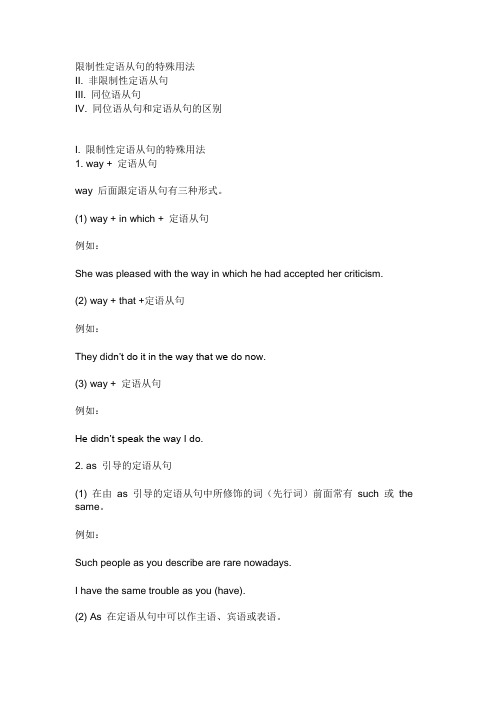
限制性定语从句的特殊用法II. 非限制性定语从句III. 同位语从句IV. 同位语从句和定语从句的区别I. 限制性定语从句的特殊用法1. way + 定语从句way 后面跟定语从句有三种形式。
(1) way + in which + 定语从句例如:She was pleased with the way in which he had accepted her criticism.(2) way + that +定语从句例如:They did n’t do it in the way that we do now.(3) way + 定语从句例如:He didn’t speak the way I do.2. as 引导的定语从句(1) 在由as 引导的定语从句中所修饰的词(先行词)前面常有such 或the same。
例如:Such people as you describe are rare nowadays.I have the same trouble as you (have).(2) As 在定语从句中可以作主语、宾语或表语。
例如:Let’s discuss only such questions as concern everyone of us.(作主语)I never heard such stories as he tells.(作宾语)I’ve never seen such a clever man as he is.(作表语)(3) As 有时引导非限制性定语从句,可在定语从句中作主语、宾语、表语,修饰主句,常解释为正如、如同。
例如:As is known to all, the earth moves round the sun.(作主语)As was expected, he performed the task with success.(作主语)As he predicted, the wind changed.(作宾语)The meeting is very important, as indeed it is.(作表语)II. 非限制性定语从句1.非限制性定语从句由who, whom, which 引导(不可用that),还可以由whose, when, where 等词引导。

英语定语从句的结构和用法定语从句的结构:定语从句通常包括三个部分:引导词、主句和从句。
1. 引导词:定语从句的引导词通常由关系代词和关系副词构成。
关系代词包括that, who, whom, whose, which等;关系副词包括where, when, why等。
2.主句:主句是指引导词所修饰的名词所在的句子。
3.从句:从句是由引导词引导的从句,用来修饰主句中的名词。
定语从句的用法:1. 修饰人:从句中用who或that引导。
- The man who is standing over there is my brother.- The woman that I met yesterday is a famous actress.2. 修饰物:从句中用which或that引导。
- The book that is on the table is mine.- The car which/that I bought last week is very expensive.3. 修饰地点:从句中用where引导。
4. 修饰时间:从句中用when引导。
- I still remember the day when we went to the beach together.5. 修饰原因:从句中用why引导。
6. 修饰所有格:从句中用whose引导。
- The boy whose father is a doctor is my classmate.需要注意的是,定语从句通常紧跟在被修饰的名词或名词短语之后,并且从句中的主语一般不可以省略,而宾语可以省略,具体要根据具体情况来确定。
同时,引导词在从句中所起的作用与其在主句中的作用相同,例如,关系代词在从句中可以充当主语、宾语、定语等。

不定代词定语从句 ⼤家了解不定代词定语从句⽤法吗?以下是店铺分享的不定代词定语从句⽤法,欢迎⼤家阅读参考! ⼀、不定代词定语从句⽤法 在限制性定语从句中,当先⾏词指⼈时,关系词可⽤who(作宾语是还可⽤whom)或that,⼆者常可互换. 但在下列情况中,⽤who(m),⽽不⽤that: (1) 当先⾏词是one,ones,any,few,anyone,anybody,someone,somebody,everyone, everybody等词时.如: Is there anyone who can answer this question? He was among the few who managed to live through the enemy prison camp. 注:在⾮正式⽂体中可以说:You’re the one that knows where to go.) (2) 当先⾏词是he,they,those,people,person等词时.如: He who wants to catch fish just not mind getting wet. Those who are against the proposal put up your hands. 注:在固定结构的谚语或习语中,可⽤he that….如: He that promises too much means nothing. (3) 当先⾏词有较长的后置定语修饰时.如: Do you know the writer in blue with thick glasses who is speaking at the meeting? (4) 在分隔式定语从句中,若先⾏词指⼈,为了明确修饰关系,应当⽤who(m).如: A new master will came tomorrow who will teach you German. There’s only one student in the school who/whom I wanted to see. I was the only person in my office who was invited. (5) 两个定语从句同时修饰⼀个指⼈的先⾏词,第⼆个定语从句常⽤who(m)来引导,如: She is the only girl I know who can play the guitar. ⼆、定语从句⽤法归纳 定语从句由关系代词who、whom、whose、which、what、as和关系副词where、when、why等引导,但须记住: 1.what不能引导定语从句. 2.关系词的分析须考虑它在定语从句中的成分。
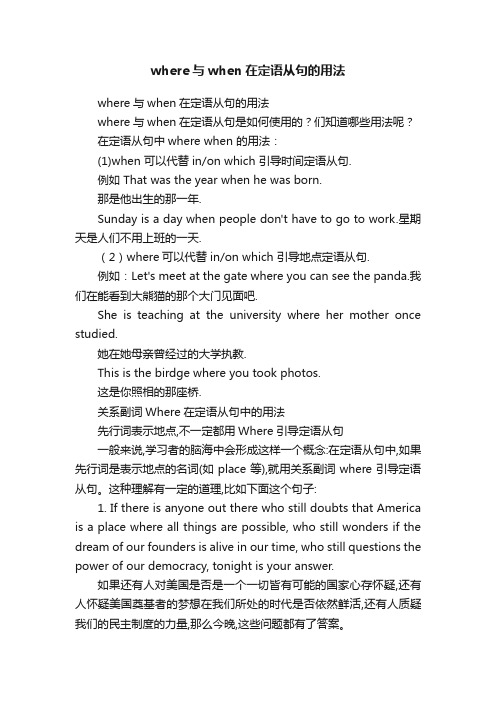
where与when在定语从句的用法where与when在定语从句的用法where与when在定语从句是如何使用的?们知道哪些用法呢?在定语从句中where when 的用法:(1)when 可以代替in/on which 引导时间定语从句.例如 That was the year when he was born.那是他出生的那一年.Sunday is a day when people don't have to go to work.星期天是人们不用上班的一天.(2)where可以代替in/on which 引导地点定语从句.例如:Let's meet at the gate where you can see the panda.我们在能看到大熊猫的那个大门见面吧.She is teaching at the university where her mother once studied.她在她母亲曾经过的大学执教.This is the birdge where you took photos.这是你照相的那座桥.关系副词Where在定语从句中的用法先行词表示地点,不一定都用Where引导定语从句一般来说,学习者的脑海中会形成这样一个概念:在定语从句中,如果先行词是表示地点的名词(如place等),就用关系副词where引导定语从句。
这种理解有一定的道理,比如下面这个句子:1. If there is anyone out there who still doubts that America is a place where all things are possible, who still wonders if the dream of our founders is alive in our time, who still questions the power of our democracy, tonight is your answer.如果还有人对美国是否是一个一切皆有可能的国家心存怀疑,还有人怀疑美国奠基者的梦想在我们所处的时代是否依然鲜活,还有人质疑我们的民主制度的力量,那么今晚,这些问题都有了答案。

定语从句一、定义在复合句中,修饰名词或代词的从句叫定语从句,被修饰的名词或代词叫先行词,通常位于定语从句之前。
引导定语从句的有关系代词who, whom, whose, which, that等和关系副词where, when, why等,关系代词和关系副词,既起到连接作用,又在定语从句中担任句子成份。
总结定语从句的一般结构为:先行词+关系词+定语从句。
一、关系代词1. 关系代词指代先行词,在从句中作主语,宾语或表语,基本用法如下表:注意:一般情况下,that既可以指人又可以指物,可以代替who, whom和which,which指物,在从句中也做主语,宾语或表语,所知识精讲以which和that在指物时,大多时候可以互换,如:This is the movie that I like best.=This is the movie which I like best.这就是我最喜欢的电影。
2. 关系代词的省略一般情况下,关系代词作宾语时可以省略,但若关系代词在从句中作介词宾语,且介词在关系代词前,不能省略,如:I’ll never forget the day that we spent together.我永远都不会忘记与你共度的时光。
(可省略)I’ll never forget the day on which we met each other.我永远不会忘记我们初次见面那一天。
(不可省)二、关系副词注意:与关系代词不同,关系副词在从句中作状语,状语并不是句子必须成分,所以即使没有关系副词,从句的内容也完整。
这是关系副词与关系代词最大的不同,也是我们选题的关键。
同时,关系副词大多可以拆分成介词+which的形式,如:This is the house where Luxun once lived.=This is the house in which Luxun once lived.这是鲁迅曾经住过的房子。

一、区分where引导的名词性、定语、状语从句例1:That’s where you are wrong.例2:Where we should go camping hasn't been decided.例3:Security guards will tell you where the airport is.例4:We have to consider the question of where we can live.例5:I have no idea where they are spending their holidays.例6:I miss the place where I lived in my childhood.例7: I miss where I lived in my childhood.例8:Put the scissors where children can’t reach them.例9:Where there is a will, there is a way. 有志者事竟成。
二、区分when引导的名词性、定语、状语从句例1:I want to know when my parents will come back.例2:When they will attend the meeting depends on the boss.例3:This is when he was born.例4:I have no idea when they will come here.例5:Have you set the day when you will move into a new house?例6:He fell asleep when he was watching TV.三、区分which引导的名词性、定语从句例1:Maria, could you tell me which hat you are going to buy.例2: These blind boxes which you bought yesterday look exactly the same.例3:These blind boxes look exactly the same. I really don’t know which one I will buy.例4:It was clear which children made his still angry.例5:That was which children made him still angry.例6:That was the boy who made him still angry.例7:Which student passed the exam is unknown.例8:The problem is which road to take.例9:We are discuss the problem that which road we should take.四、区分who引导的名词性、定语从句例1:Who will come tomorrow is still a secret.例2: We think Tom will come, but we are still not sure whether he will come. 例3:I have no idea who will come tomorrow.例4:The scientists who were invited here are from all over the world.五、区分that引导的名词性、定语从句、状语从句The boss asked the secretary to hurry up with the letters so that he could sign them. There is no doubt that taking exercises is beneficial to our health.Her wish is that she could lose weight in a short time.He told me that he was leaving for Japan.The doctor thinks it necessary that I take plenty of exercise every day.It is a pity that he can’t come.六、区分as从句例1: As time goes on, it's getting warmer and warmer.You will grow wiser as you grow older.例2: As this question is of great importance, we will discuss it once again.We couldn’t send the children to school as life was very hard in those days.例3:You must try to hold the tool as I do.Leave things as they are.例4:He isn’t the same person as he used to be.I have never heard such story as he is telling.例5:Difficult as it is, we should not give it up.Child as he is, he knows something about electricity.Strange as it may seem, nobody was injured in the accident.Try as he may, he never succeeds.例6:This film is as interesting as that one.Your pen writes as smoothly as mine.This dictionary is not as/so useful as you think.例7:As is often the case, we have overfull filled the production plan.This machine, as might be expected, has stopped operating.She is late, as is often the case.To shut your eyes to facts, as many of you do, is foolish.此外还有:。


主语的定语从句 主语的定语从句如何辨认呢?下⾯是店铺整理的主语的定语从句,欢迎⼤家阅读参考,希望帮助到你。
1、连接词有⼏个? ⼀共有9个:who ,whom , whose, that, which , when , where, why, as 2、引导词的功能有哪些? (1)引导定语从句。
(2)代替先⾏词在定语从句中充当⼀个成分。
3、定语从句的关键是? 判断先⾏词在定语从句中充当什么成分。
根据充当的成分选择相应的引导词。
4、只能⽤that引导定语从句有哪些情况? 先⾏词前⾯为all, everything, nothing, something, anything, little, much等不定代词时; 先⾏词前⾯有:all, every, no, some, any, little, much, few等不定代词修饰时; 先⾏词被叙述词修饰时;先⾏词被形容词最⾼级修饰时;先⾏词前⾯有only, just, very, last等修饰时;先⾏词是表⽰⼈和物混杂的两个名词时;主句是以who, which,开头的疑问句或先⾏词是疑问代词时; 在修饰时间、地点等先⾏词时,只有⽤that代替when, where等引导词。
先⾏词为reason, way (意为"⽅法")时,常⽤that 代替why, which, in which,也可省略. 引导词在定语从句中作表语时,多⽤that引导. 先⾏词是主句表语时.例:It is a dictionary that will help you a lot. 当主语以there be 开头时.当先⾏词是数词时.同⼀个复合句⾥有两个定语从句,⼀个⽤which,另⼀个通常⽤that. 5、reason后⾯⽤什么引导?way 后⾯⽤什么引导? reason后⾯的定语从句⽤why引导。
way 后⾯定语从句⽤in which 或that引导that可以省略。

when和where引导定语从句的⽤法定语从句既是英语语法的⼀个重点,同时⼜是⼀个难点。
说它是难点,主要难在两点上:⼀点是如何正确判断什么样的汉语句⼦要译为英语的带定语从句的复合句;另⼀点是定语从句的引导词较多(包括关系代词who, that, which, as 和关系副词when, where, why),⽽且其⽤法也较复杂。
那么到底什么情况下⽤when和where来引导定语从句呢它们⼜该怎么⽤呢下⾯就举例说明:⼀、when:当主句中的先⾏词(即主句中被后⾯定语从句修饰的词)是表⽰时间意义的名词时,它只能作定语从句的时间状语,放在定语从句句⾸。
如果定语从句的引导词是作该定语从句的主语或宾语,则要改⽤关系代词that或which来引导。
例如:The days when we used foreign oil are gone. 我们⽤洋油的⽇⼦⼀去不复返了。
I'll never forget the day when I was born. (=I'll never forget my birthday.) 我永远不会忘记我出⽣的⽇⼦。
It happened in November when the weather was wet and cold. 这事发⽣在天⽓⼜湿⼜冷的⼗⼀⽉。
In the years that (which) followed, Marx kept on studying English and using it. 在这之后的⼏年中,马克思继续学习和使⽤英语。
(that作定语从句"that followed"的主语)The day (that) I always remember in all my life is my birthday. 我⼀⽣中最难忘的⽇⼦是我的⽣⽇。
(that作定语从句"that I always remember in all my life"的宾语,that可以省略)⼆、where:当主句中的先⾏词是表⽰地点意义的名词时,它只能作其所在的定语从句的地点状语,放在定语从句的句⾸。
定语从句用where when that when或which填空:
1 I like a place_there are beautiful views.
2 My sister has gone to
a place_is called “Stone Forest”.
3 Have you ever heard of a place _is famous for its fish and rice.
That’s my hometown _we were born and grew up.
4 I’d like to go a place _has a lot of flowers and trees.
5 All of us want to go to a place _there are a lot of flowers and trees.
6 They had a
wonderful vacation at a place _ they did a lot of outdoor activities.
7 I want to go somewhere _is good for me to study.
8 She wants to go somewhere _ she can learn English well.
9 I hope to retire somewhere _the
weather is always warm.
10 Teenagers would like to go somewhere _ is fun .
11 This is the school _ I studied 5 years ago.
12 Look at the school _is so nice.
13 Both my parents worked at the factory
_is famous.
14 Both of his parents visited the factory _they worked together.
15 We miss the old days _we spent in playing games.
16 We miss the old days _we spent time in playing games.
17 They remembered
the old days _they had
a good time.
18 Don’t forget the time _was hard for us, because it’s the important experience for our life.
19 It’s a good time for us _we could watch TV or movies together.。